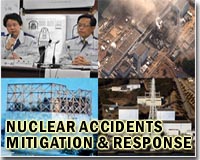| . |  |
. |
Yokote, Japan (AFP) March 31, 2011 Refugees who fled Japan's tsunami-hit nuclear reactors say they have been betrayed by the company that runs them, accusing embattled operator TEPCO of creating a "man-made disaster". Tens of thousands of people left their homes near the Fukushima Daiichi nuclear plant after it was crippled by the massive quake and tsunami that hit Japan on March 11, washing away whole towns. Some have had to travel huge distances away from their homes and the plant, which has been spewing radioactive vapour, to find shelter. "Many of us feel betrayed," said Tomoko Sato, 55, who is living in a refuge centre in Yokote, Akita prefecture, more than 200 kilometres (120 miles) north of the plant. "We were told again and again it was safe," said Sato, who left her home in Minamisoma, a small town inside the 20-kilometre evacuation zone around the plant run by Tokyo Electric Power Company (TEPCO). Sato broke her collarbone when she was washed into a muddy stream by the tsunami as it swept through her town. She was pulled from the water by her husband. Many Fukushima refugees evacuated to large facilities, such as the Saitama Super Arena, an indoor stadium just north of Tokyo, where up to 2,000 people were living at one point. But others were left to try to find their own shelter, roving around in small groups with nothing but coats and blankets to protect them against the freezing March weather. The earthquake and tsunami that ravaged Japan's northeast coast, killing 11,000 people and leaving more than 16,000 missing, knocked out cooling systems at the plant, leaving the nuclear cores to heat up uncontrollably and sending radiation into the air and the sea. "I feel very angry with TEPCO," said Ikuko Ishibashi, a 63-year-old who farms in the shadow of the plant, but who has decamped to Yokote. "The earthquake and tsunami were natural disasters, but this is a man-made disaster," said Ishibashi, whose husband has remained on the farm to look after their livestock. "We would be able to restart our life more easily if we had only had the quake and tsunami," she said. Ishibashi said the long-term effect of the leaking radiation and its contamination of farmland could do irreparable damage. "We can't do anything unless the problem with the nuclear reactor is resolved," she said. "I want the reactors to be dismantled as soon as possible." Although negotiations on compensation have yet to begin, the goverment's Chief Cabinet Secretary Yukio Edano said TEPCO bears "primary responsibility" for the disaster. In Tokyo, TEPCO chairman Tsunehisa Katsumata apologised on Wednesday for "causing great trouble." He admitted anti-tsunami measures were "insufficient" but stopped short of giving any assurances over compensation. Toshinori Sato said refugees had been panicked by the lack of information and by the inadequate evacuation measures put in place. "Because we did not have enough information, our anxiety increased," said Sato, who says his family was ordered by local authorities to "run far away from the plant" without being told where to go. "People may say too much information creates confusion, but not enough information has a greater impact," he said. Sato said he held the government at least partially responsible for the refugees' plight as it had not ensured that TEPCO was operating safely enough. "The government's instructions did not work. It would not surprise me if there was another crisis like this one at another reactor," he said. Many refugees say their primary concern is over the long-term impact of radiation on health, especially among the young. Ryoko Shiraishi left her home five kilometres outside the evacuation zone because she was worried about what might happen to her five-year-old girl and two-year-old boy. "A lot of parents with young children like us decided to evacuate unless they had a strong reason for staying," the 34-year-old housewife said. "That's a parent's responsibility." While some residents have given up on the idea of ever returning to Fukushima, the Sato family still hanker after life back in their home town. "Once it's settled down, we want to go back," said Tomoko Sato, whose company has guaranteed her a job if she returns. "We don't know when but we want to buy a new house eventually," she said. "But it should be in a location where the sea is not in sight, and it should be far away from the plant."
Share This Article With Planet Earth
Related Links Bringing Order To A World Of Disasters A world of storm and tempest When the Earth Quakes
 Pressure on Japan to widen nuclear evacuation zone
Pressure on Japan to widen nuclear evacuation zoneSendai, Japan (AFP) March 31, 2011 Japan said Thursday there were no immediate plans to widen the exclusion zone around its stricken nuclear plant, hours after the UN atomic watchdog agency voiced its concern over the issue. In Washington, the Pentagon ordered a Marine emergency nuclear response unit to deploy to Japan as a precautionary move and to stand ready to assist in Japan's response to the crisis at the tsunami-hit Fu ... read more |
|
| The content herein, unless otherwise known to be public domain, are Copyright 1995-2010 - SpaceDaily. AFP and UPI Wire Stories are copyright Agence France-Presse and United Press International. ESA Portal Reports are copyright European Space Agency. All NASA sourced material is public domain. Additional copyrights may apply in whole or part to other bona fide parties. Advertising does not imply endorsement,agreement or approval of any opinions, statements or information provided by SpaceDaily on any Web page published or hosted by SpaceDaily. Privacy Statement |